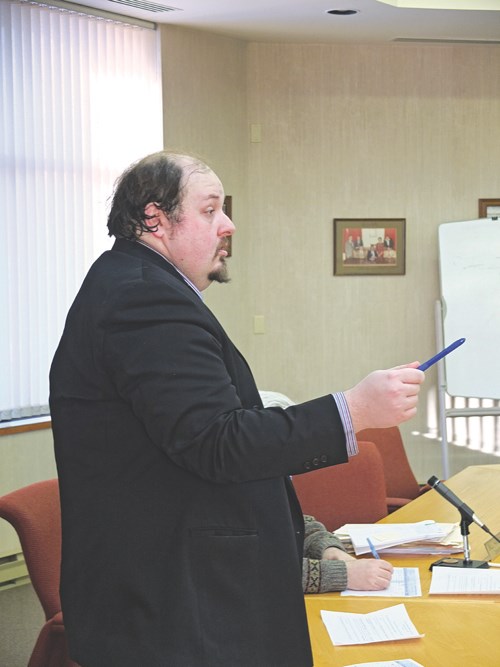“We will start the bidding off at $11,480 – $11,480 on property number one.”
The deep voice of Raphael Saray, CFAR personality and, on this day, auctioneer extraordinaire, fills the sparsely populated Flin Flon City Hall council chambers.
Behind him, radiant rays of winter sunshine penetrate the windows and blinds. Squares of light illuminate the carpet nearby. Saray pauses.
“$11,480, looking onccce,” he continues, scanning the room with his blue pen extended toward the public gallery.
Another pause.
“Looking twiccce.”
Brief pause.
“I guess that will be sold to the City of Flin Flon.”
Sharply dressed in a dark suit and striped tie, Saray is keeping his trademark wit under wraps for the proceedings. It’s all business today, even if business is slow.
It’s the morning of Tuesday, Jan. 31. The city’s tax sale auction is offering 17 properties – three commercial buildings and 14 residences – to the highest bidder.
Eleven prospective bidders spread across the public seating gallery gaze at Saray. Some appear focused; others slightly disinterested.
Their ranks include owners of multiple properties in the market for a good bargain. But are they willing to buy what Saray is selling?
For the most part, the answer is no. Even the former Verona’s /
Chucky D’s restaurant, worth six figures and still functional as a takeout place, garners no bites. Instead, the city takes on ownership of a building on which it was owed $25,736.
Two blocks away, the city also picks up the former Edie’s Closet secondhand store on Main Street, a building that has housed various entrepreneurial endeavours over the years. Its outstanding tab: $11,477.
The auction becomes interactive only when the modest, but recently inhabited, house at
29 Second Avenue reaches the docket. Souray sets the opening bid at $6,350, a few dollars more than the tab owing on the home.
A man on the east side of the council chambers raises his hand; another man on the west side ups the ante by $50. A gentle bidding war ensues, concluding six bids later.
“That will be sold to the gentleman in the back for $6,700,” Souray declares, signalling the easterner’s victory.
Fourteen other residential properties land in municipal hands. Most are in the uptown area, where Flin Flon’s oldest homes call home, though there are three in Channing and one each on Windsor Avenue and Bracken Street.
Of course the city will pay no actual money to assume ownership of these properties. But nor will the city – and by extension
Flin Flon residents – be reimbursed for the outstanding taxes that put these buildings on the auction block in the first place.
When Saray attempts to hock the most well-known building on his list, Main Street’s former Hong Kong Restaurant, he again receives no bids, not even a standard reserve bid from the city.
This comes as little surprise. Mark Kolt, the city’s chief administrative officer, had told the room that the Hong Kong is the subject of a demolition order of about $50,000. To own the building would be to take on that tab.
“The building is in very poor condition,” Kolt says, underscoring his point.
With no takers, the Hong Kong stays with its current owners, who remain responsible for demolition costs.
After Saray auctions off the final property –
9 Jones Square in Channing, to the city, the council chambers quickly empty.
The morning’s final tally – 15 properties for the city, one for a private owner and one staying with the current owner – is by no means unusual for these sales.
In an interview, Kolt explains that only about half of tax sale auctions see any properties sold to parties other than the municipality.
“Private purchases are very much the exception rather than the rule,” he notes.
Kolt adds that this year’s sale featured only “a few more” properties than the typical 12 to 15.
The city’s next step will be to assess its newly acquired properties to see if they can be rehabilitated. City Hall remains open to offers on the buildings, but as is the case every year, most of them are likely to be demolished.
And the house on Second Avenue that sold to a private bidder? As Kolt told bidders of all of the available buildings prior to the auction, “You’re taking them as is.”




